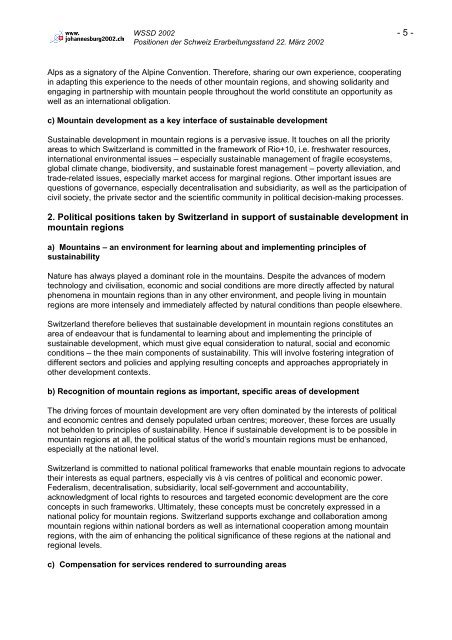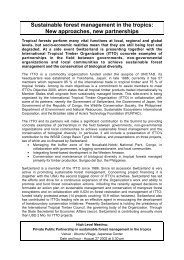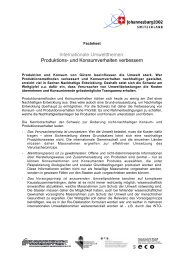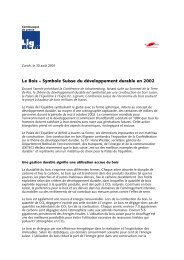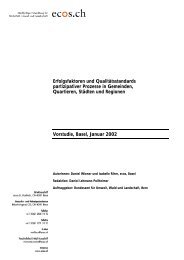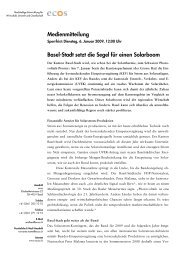Extract from the Position Paper
Extract from the Position Paper
Extract from the Position Paper
You also want an ePaper? Increase the reach of your titles
YUMPU automatically turns print PDFs into web optimized ePapers that Google loves.
WSSD 2002 - 5 -<strong>Position</strong>en der Schweiz Erarbeitungsstand 22. März 2002Alps as a signatory of <strong>the</strong> Alpine Convention. Therefore, sharing our own experience, cooperatingin adapting this experience to <strong>the</strong> needs of o<strong>the</strong>r mountain regions, and showing solidarity andengaging in partnership with mountain people throughout <strong>the</strong> world constitute an opportunity aswell as an international obligation.c) Mountain development as a key interface of sustainable developmentSustainable development in mountain regions is a pervasive issue. It touches on all <strong>the</strong> priorityareas to which Switzerland is committed in <strong>the</strong> framework of Rio+10, i.e. freshwater resources,international environmental issues – especially sustainable management of fragile ecosystems,global climate change, biodiversity, and sustainable forest management – poverty alleviation, andtrade-related issues, especially market access for marginal regions. O<strong>the</strong>r important issues arequestions of governance, especially decentralisation and subsidiarity, as well as <strong>the</strong> participation ofcivil society, <strong>the</strong> private sector and <strong>the</strong> scientific community in political decision-making processes.2. Political positions taken by Switzerland in support of sustainable development inmountain regionsa) Mountains – an environment for learning about and implementing principles ofsustainabilityNature has always played a dominant role in <strong>the</strong> mountains. Despite <strong>the</strong> advances of moderntechnology and civilisation, economic and social conditions are more directly affected by naturalphenomena in mountain regions than in any o<strong>the</strong>r environment, and people living in mountainregions are more intensely and immediately affected by natural conditions than people elsewhere.Switzerland <strong>the</strong>refore believes that sustainable development in mountain regions constitutes anarea of endeavour that is fundamental to learning about and implementing <strong>the</strong> principle ofsustainable development, which must give equal consideration to natural, social and economicconditions – <strong>the</strong> <strong>the</strong>e main components of sustainability. This will involve fostering integration ofdifferent sectors and policies and applying resulting concepts and approaches appropriately ino<strong>the</strong>r development contexts.b) Recognition of mountain regions as important, specific areas of developmentThe driving forces of mountain development are very often dominated by <strong>the</strong> interests of politicaland economic centres and densely populated urban centres; moreover, <strong>the</strong>se forces are usuallynot beholden to principles of sustainability. Hence if sustainable development is to be possible inmountain regions at all, <strong>the</strong> political status of <strong>the</strong> world’s mountain regions must be enhanced,especially at <strong>the</strong> national level.Switzerland is committed to national political frameworks that enable mountain regions to advocate<strong>the</strong>ir interests as equal partners, especially vis à vis centres of political and economic power.Federalism, decentralisation, subsidiarity, local self-government and accountability,acknowledgment of local rights to resources and targeted economic development are <strong>the</strong> coreconcepts in such frameworks. Ultimately, <strong>the</strong>se concepts must be concretely expressed in anational policy for mountain regions. Switzerland supports exchange and collaboration amongmountain regions within national borders as well as international cooperation among mountainregions, with <strong>the</strong> aim of enhancing <strong>the</strong> political significance of <strong>the</strong>se regions at <strong>the</strong> national andregional levels.c) Compensation for services rendered to surrounding areas


